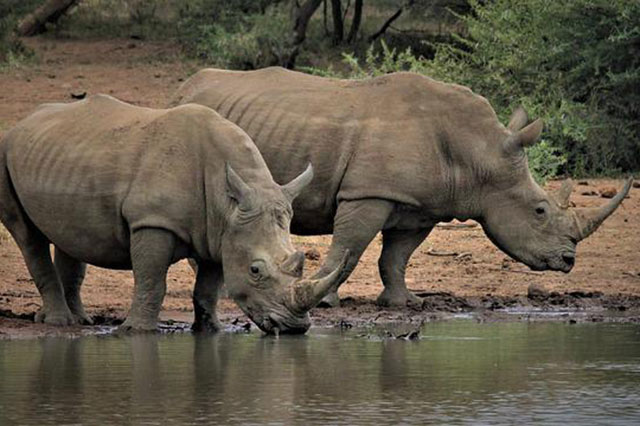Gaborone – Botswana revealed on Monday that it suffered a huge spike in rhino poaching during five years up to 2021, translating to about a third of its population of the endangered species.
In all 138 rhinos were slaughtered between 2018 and last year, Tourism minister Philda Kereng told parliament.
This compares to two rhinos poached in the preceding five years between 2012 and 2017, according to official figures.
ALSO READ | South Africa rhino poachers spread from national parks
Statistics which Kereng presented to parliament showed killings suddenly rose to seven in 2018, before spiking to 30 the following year. In 2020 the killings rose sharply again to 62, then halved to 33 in 2021 before dropping to six last year.
She attributed the jump in killings to “increased demand for rhino horn in the international market hence poachers” and also “a displacement of international criminal syndicates from other southern African states”.
Neighbouring South Africa, the traditional rhino poaching hotspot, has in recent years seen a steady decline in numbers of animals killed due to increased patrols in national parks that has forced hunters seeking horns to look elsewhere.
Poaching of rhino is driven by demand from Asia, where horns are used in traditional medicine for their supposed therapeutic effect.
Botswana does not publicly disclose its rhino population, but a document government presented before the Convention on International Trade in Endangered Species (CITES) in Panama last year, showed there were an estimated 285 white rhinos and 23 black rhino across the country.
ALSO READ | Botswana threatens to cut ties with diamond giant De Beers
In 2019, the country was home to just under 400 rhinos, according to Rhino Conservation Botswana, most of them roaming the grassy plains of the northern Okavango Delta.
According to another government document, Botswana had in recent years started dehorning rhinos to reduce their appeal to poachers, but this has not had the desired effect, as the stump of horn left would still be valuable for the poachers.
Rangers, law enforcement agencies and non-governmental organisations have stepped up aerial and ground patrols to protect the rhino.
Follow African Insider on Facebook, Twitter and Instagram
Source: AFP
Picture: Pixabay
For more African news, visit Africaninsider.com


